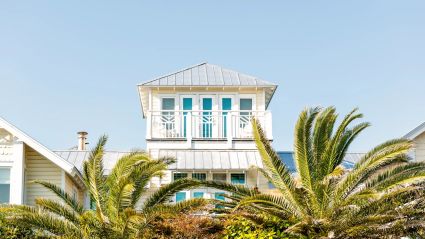| Fractional real estate vs. timeshare |
|---|
| Fractional vacation home ownership grants you partial ownership of a property's title, while timeshare ownership only allows you to own blocks of time to use a property. |
| Fractional ownership | Timeshare | |
| Number of owners | At least two owners | Up to 52 owners |
| Scheduling availability | Five weeks or more | One to two weeks |
| Equity benefits | Property may appreciate in value | Owners do not have equity |
| Management | Owners can regulate it | Owners have no role in management |
| Maintenance | Owners are responsible for maintenance and taxes | Owners pay maintenance fees and annual taxes |
| Building | Single-family and multifamily units | Typically multifamily units |
| Resale value | Real estate tends to appreciate | Timeshares tend to depreciate |
Is fractional ownership the same as a timeshare?
Fractional ownership is not the same as a timeshare because it means you actually own a piece of the property, giving you an equity stake that can change in value. You also get more usage time, often weeks or months, in typically higher-end properties like luxury homes. Timeshares, on the other hand, are just a right to use a property for a short period (usually a week) with no actual ownership or equity gained.What is a timeshare?
Timeshares are a way to buy the right to use a vacation property for a specific amount of time. That means no true property ownership and no gained equity. In most cases, buying a timeshare means paying for one week-long access to a condo, apartment or resort room. The average upfront cost for a timeshare unit is around $23,200, plus yearly maintenance fees, which often increase over time. The value of timeshares has long been debated — while upfront costs are relatively low compared to owning a second home, depreciation is high and resale opportunities are uncertain.| Pros | Cons |
| Less expensive than a home purchase | Increasing annual maintenance fees |
| Condo-style accommodations | Resale process is difficult |
| Easy booking | Value depreciates over time |
What is fractional home ownership?
Fractional home ownership is a shared real estate purchase strategy where multiple parties collectively own a property, distributing the costs among them. Typically found in condo and resort settings, this approach differs from traditional timeshares.While timeshares might restrict property access to just a few weeks annually, fractional property ownership often grants owners access for multiple weeks a year, contingent on the number of joint owners.Because these units have fewer owners than timeshares, fractional owners often have more of a say in decisions regarding property maintenance and upkeep. Many fractional properties also offer on-site storage for owners.| Pros | Cons |
| Deeded ownership | More expensive than timeshares |
| Fewer owners | Access is still not unlimited |
| Value appreciation | Higher annual fees |
Timeshare vs. fractional ownership: 8 differences
Unlike short-term rentals, both timeshares and fractional ownership properties allow you to own part of your vacation experience. Although they share this similarity, these ownership models differ in seven key ways.1. Number of owners
The number of owners is an important factor to consider, since fractional owners may have to communicate and share decision-making responsibilities. Here is what to expect with both vacation ownership models:- Fractional ownership: Most fractional ownership properties limit ownership to 6-14 parties per unit.
- Timeshare: A single unit could have up to 52 owners.
2. Scheduling availability
As a co-owner, you’ll need to be cognizant of when the shared home is available to book. The number of days or weeks the home will be available largely depends on how many owners there are. Here is what potential scheduling availability could look like for both options:- Fractional ownership: Fractional ownership can allow access to the home for five weeks or more per year. Scheduling availability ultimately depends on the number of owners per unit.
- Timeshare: A traditional timeshare limits access to the property to one to two weeks per year.
- Fractional ownership: If you own a 1/8th share of a Pacaso home, you'll generally get about 6-7 weeks of use each year, booked through an app. The system makes sure everyone gets fair access, including during some popular times. The fewer owners a home has, the more time you'll get to use it personally.
- Timeshare: Most timeshares are sold for one week at a time. So, if you buy a timeshare for July at a specific resort, you get to use that same week every year. While some let you pick different weeks (called "floating weeks"), your total usage is usually still just one or two weeks per year.
3. Equity benefits
A vacation home can potentially serve as an investment that benefits owners with equity and value appreciation. Here are the equity opportunities for fractional ownership and timeshares:- Fractional ownership: As a co-owner of real estate, you can benefit from equity and value appreciation over time.
- Timeshare: Since you only own a block of time at the vacation property, you cannot reap the benefits of equity.
- Fractional ownership: Since you actually own part of the property, if real estate prices go up in a popular spot like Vail, your fractional share also becomes more valuable. You're investing in a physical asset that can grow in worth, just like a regular house.
- Timeshare: Even if property values in Cancun soar, your timeshare's value likely won't increase. You're buying the right to use the property for a set time, not actual real estate. This means you don't build equity like with traditional home ownership, and reselling your timeshare is often difficult and for a much lower price.
4. Management
Vacation homeowners can choose to share property management, hire a property management company, or have no say at all. Here is how property management opportunities break down for both:- Fractional ownership: Co-owners can make joint decisions about how their shared vacation property is managed, like hiring a property manager.
- Timeshare: The timeshare developer, hotel or resort makes all property management decisions.
- Fractional ownership: When you buy a Pacaso share, Pacaso manages the home for you, taking care of cleaning, maintenance, and bills. While Pacaso handles daily tasks, owners still get a say in big decisions through their agreement, offering more control than a timeshare.
- Timeshare: If you own a timeshare at a Hilton Grand Vacations resort, Hilton (the company) makes all decisions about managing the property, like renovations and staffing. Timeshare owners have very little say in these choices, beyond paying their yearly fees.
5. Maintenance
Similar to management, vacation home maintenance is a crucial part of owning a vacation property. This is how maintenance works for both options:- Fractional ownership: All owners must share the cost of maintaining their vacation property. Some co-owners decide to outsource this responsibility.
- Timeshare: Timeshare owners must pay annual maintenance fees that are subject to increase every year. The fee covers all maintenance costs.
- Fractional ownership: With a Pacaso home, your monthly fees cover everything from maintenance and utilities to property taxes. Pacaso takes care of all the chores like landscaping and cleaning, so you can simply enjoy your luxury home. All these costs are split fairly among the owners.
- Timeshare: At a big resort timeshare, you pay an annual fee for the resort's upkeep, including pools and your unit. These fees are required even if you don't use your timeshare and usually go up each year.
6. Building
One of the biggest differences between fractional ownership of a vacation home and timeshares is the type of structure you’ll be staying in. Here is what to expect:- Fractional ownership: Both single-family and multifamily homes are available for co-owners to choose from in urban, suburban and rural areas.
- Timeshare: Timeshares are generally multifamily units within a hotel or resort complex.
- Fractional ownership: Imagine a beautiful, $5 million luxury home in Napa Valley. With Pacaso, you could buy a 1/8th ownership share, meaning you legally own a piece of the home and share its use and costs with seven other people. You get dedicated time there each year, and your share could grow in value if the house does.
- Timeshare: Think of a one-bedroom unit at a big Orlando resort, like a Marriott. You don't own part of the resort. Instead, you buy the right to use that unit for one week each year for a specific time. You pay an upfront fee and yearly maintenance, but you only get to use it, not own any real estate.
7. Cost
Fractional ownership costs a lot more upfront because you're actually buying a share of a high-end property. Timeshares are cheaper to start, but you only get the right to use the property for a short time. Also, you'll pay ongoing fees that determine how much the average timeshare is per month, often between $140 and $500.- Fractional ownership: You buy a real piece of a luxury property, costing much more upfront but offering potential for your investment to grow.
- Timeshare: You pay less initially for the right to use a property for a short time each year, but you don't own it and will have ongoing monthly fees without gaining equity.
- Fractional ownership: Maria bought a 1/8th share of a luxurious Napa Valley home through Pacaso for $500,000. When life changes prompted her to sell, she listed her share just like any other property. Pacaso even helped her find a buyer. Thanks to rising home values in Napa, Maria sold her share for $580,000, pocketing an $80,000 profit. Her fractional share acted like a traditional real estate investment, appreciating with the market.
- Timeshare: Now, consider David, who bought an Orlando Marriott timeshare for $25,000 five years ago. Ready to sell, he quickly hit the harsh reality: his timeshare's value plummeted. He struggled to find a buyer in a flooded market, often finding his interest was worth only a few thousand dollars—or less. Unlike Maria, David's timeshare offered usage but virtually no return on his investment.
8. Resale value
The resale process can look different for both ownership models. Here is what to expect when you’re ready to sell your vacation property:- Fractional ownership: Co-owners can sell their vacation home like a regular piece of real estate and generally expect to benefit from value appreciation.
- Timeshare: Timeshares typically depreciate over time and will likely be sold at a reduced cost.
- Fractional ownership: With Pacaso, if you own a share of a Napa Valley home, you can sell it just like any other property. Pacaso can even help you find a buyer. If home values in Napa rise, your share could sell for more than you paid, earning you a profit.
- Timeshare: If you try to sell your Orlando Marriott timeshare, its value will probably be much lower than what you paid. Selling timeshares is often hard, with many going for a small fraction of the original price, or even just for the leftover fees.
Other popular vacation options
Timeshares and fractional ownership models aren’t the only ways to enjoy a vacation property. Let’s take a look at other popular vacation options like private residence clubs and destination clubs.Private residence club
Private residence clubs are similar to fractional properties in that both offer ownership interest in shares of a vacation property. Private residence clubs typically:- Are operated by luxury hospitality chains
- Have amenities usually found in high-end hotels
- Sell condominiums or villas
- Share access to the club’s golf courses or ski resorts
- Provide professional room cleaning and turndown service
- Provide access to other properties in the chain’s portfolio
| Pros | Cons |
| Access to luxury amenities | Very expensive |
| Deeded ownership | Resale challenges |
| Gained equity | High annual fees |
Destination club
A destination club grants members proprietary access to its services, which means high-end vacation homes on a non-equity basis in various locations around the world. With destination clubs:- Paying membership fees give a wide variety of luxury homes to rent
- Membership tiers offer varying levels of reservation priority
- You can stay in luxury single-family homes
- You can access amenities like beach clubs, private chefs and high-end spas
| Pros | Cons |
| Single-family homes in varied locales | Pricey membership fees |
| Pay-as-you-go model | Limited inventory |
| Luxury amenities | No gained equity |
The Pacaso difference
Pacaso’s professionally managed LLC co-ownership model offers a better, smarter, more modern way to own a second home. It's like having a few families come together to purchase a home and share the costs, but Pacaso takes care of all the details so that you can enjoy your home without the risk and hassle associated with a DIY co-ownership process.Pacaso offers:- True real estate property ownership that moves in value with the whole-home market — as a true owner, any equity realized is yours
- Ownership of a residential home, not just the right to use a condo or hotel room
- A fully furnished, professionally managed home where you don't have to deal with the typical hassles of second home ownership
- A smaller owner group; instead of up to 52 owners with timeshares, a Pacaso has a maximum of eight
- Exclusive use of the home by vetted owners and their guests through an equitable scheduling system, with no third-party rentals allowed
- Lower operating costs on items such as property management and repairs
- A streamlined and standardized resale approach — just like a whole home
FAQ about fractional ownership vs. timeshare
01: How does fractional ownership work?
Multiple buyers can form an LLC to jointly purchase a property. All co-owners will be responsible for the property’s expenses, like maintenance and utilities, and must agree on scheduling and property management.
02: How is timeshare ownership typically split?
Timeshare ownership is generally split into one to two weeks per family or individual every year.
03: Is fractional ownership a good investment?
Fractional ownership may be a good investment for vacationers who frequent the same destination and may want to co-own a second home.
04: Is fractional ownership better than a timeshare?
Fractional ownership may be better than a timeshare for people who can afford a higher initial purchase price and want to spend more than a week or two at their destination. Fractional co-owners can also potentially benefit from equity.
05: How much is the average timeshare per month?
The monthly cost of a timeshare varies significantly, typically ranging from $300 to $1,200 for maintenance fees alone. The total cost depends on what you paid for it initially, if you financed it, and any additional ongoing fees.










